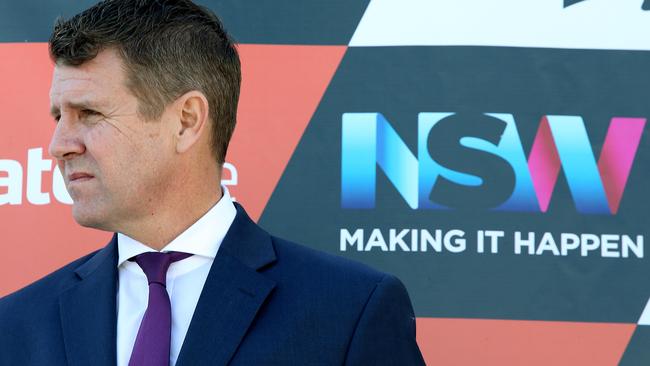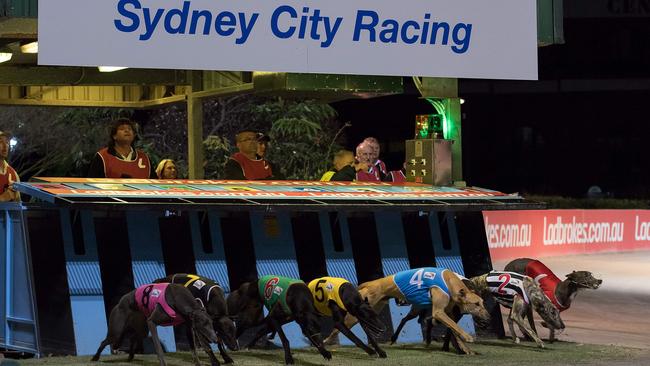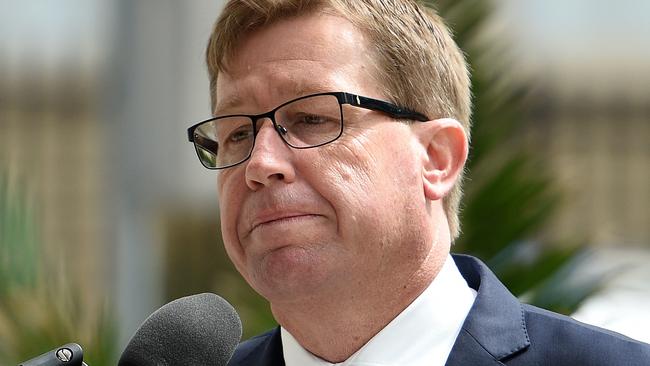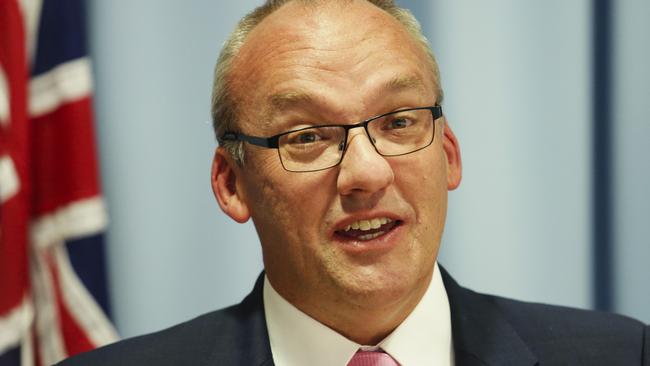NSW Premier Mike Baird tipped to reverse greyhound ban — but could the backflip work out in his favour?
THE greyhound racing ban has become a “poison issue” for the NSW Premier but is a mooted embarrassing backdown a smarter move than we think?

IF IT comes to pass, it will be one of the most extraordinary backflips a Premier has made.
On Monday reports emerged that NSW Premier Mike Baird, after months of defending his massively controversial plan to shut down the state’s entire greyhound racing industry, will imminently axe the axe.
Announcing the initial ban in July, Mr Baird said widespread animal cruelty meant “we are left with no acceptable course of action except to close this industry down.”
However, with a by-election in a rock solid seat now looking distinctly shaky, the leadership of the Liberal’s coalition partners up in the air and even Mr Baird’s own staying power being questioned, the Premier looks to have been backed into a corner where a back down is the only option.
An expert in the NSW political scene has said the issue was “poison” and the Premier had little room to do anything else but, handled well, the U-turn could actually bolster Mr Baird’s flagging fortunes.

The premier and his deputy, and Nationals leaders, Troy Grant have stared down intense pressure since announcing the controversial decision to shut down the dishlickers three months ago.
The ban is due to come into force next July.
Mr Baird’s protestations that the ban is the only right and moral course of action for a rotten industry has coincided with his popularity falling through the floor.
Going from hero to less than zero, his net satisfaction score had gone from plus 37 per cent in December to minus seven per cent now.
Meanwhile, a by-election in the country NSW electorate of Orange is shaping up as a referendum on the plan with the Nationals in panic mode facing possible defeat in a safe seat.
On Monday, just hours before a Nationals party room was due to take place where Mr Grant’s leadership was said to be up for discussion, reports emerged that Mr Baird was having a change of heart on greyhounds.

The industry would now be given a stay of extension to see if it can clean up its act.
“The plan b seems to be a trial to put in tough regulations and see how it works but you have to ask why he didn’t do that in the first instance,” Associate Professor Gregory Melleuish from the University of Wollongong told news.com.au.
The expert in history and politics said the greyhound saga had highlighted two flaws in Mr Baird’s leadership — the first was his inability to look beyond the needs of his comfortable North Shore electorate.
“Where is his seat? Manly?
“I had a look at where the greyhound racing tracks are and there are not many in Sydney. It’s mainly in country towns so this belongs to a world that Mike Baird only has a shadowy understanding of,” Prof Melleuish said.
“There’s a tendency for politicians to live in a bubble and not get out as much as they should. He may have thought animal cruelty was something that gets people feeling emotional but didn’t look more carefully about the task ahead.
“People are going to lose their jobs in country areas where there may not be other avenues of employment so banning animals being used in races has to balanced with affecting livelihoods,” he said.
Mr Baird’s second problem was the desire to be decisive. “Politicians, these days, have to look like when they make a decision they’re as tough as (late British Prime Minister) Maggie Thatcher but where does toughness end and inflexibility begin?”
The reaction to the possibility of Baird’s back down has been swift. Shooters, Fishers and Farmers MLC Robert Borsak — whose party is hoping to gain from the Nationals woes in Orange — said anything short of fully reversing the ban and allowing the industry to go back to self governance was “political window dressing”.
Labor leader Luke Foley, who has spent months criticising the Government’s plans, said Mr Baird’s change of heart had little to do with concern for the industry.
“Perhaps the principles of saving his own skin and those of his National party allies in the Orange by-election is the most important principle to him.”
But, despite the backflip, Prof Melleuish said it could work out in Mr Baird’s favour. Certainly, there was no immediate successor waiting in the wings so, for now at least, his premiership seems safe.

“It’s a poison issue that he needs to put behind him but it’s not the only issue,” he said, highlighting the controversial lockout laws and forced council mergers.
“Part of the perception (with Mr Baird) has been the idea that he’s too rigid. If he can show he’s more flexible and accommodating that will soften his public image and if he can get that side right in 12 months people will be asking ‘what’s this about the greyhounds’.”
The dishlicker’s drama could even be a “learning experience” for Mr Baird.
“If he can be seen as both a moral person but also someone who listens to the community then that could have a very positive effect.”
But the Liberals needed to learn the lesson that Labor seems to have caught onto already — that it matters more how contentious issues resonate in marginal seats than in a party’s heartland.
“Baird can afford to upset some people on the North Shore occasionally but he has to be very wary of rural, regional and outer suburban seats as that’s where governments are won and lost.”




